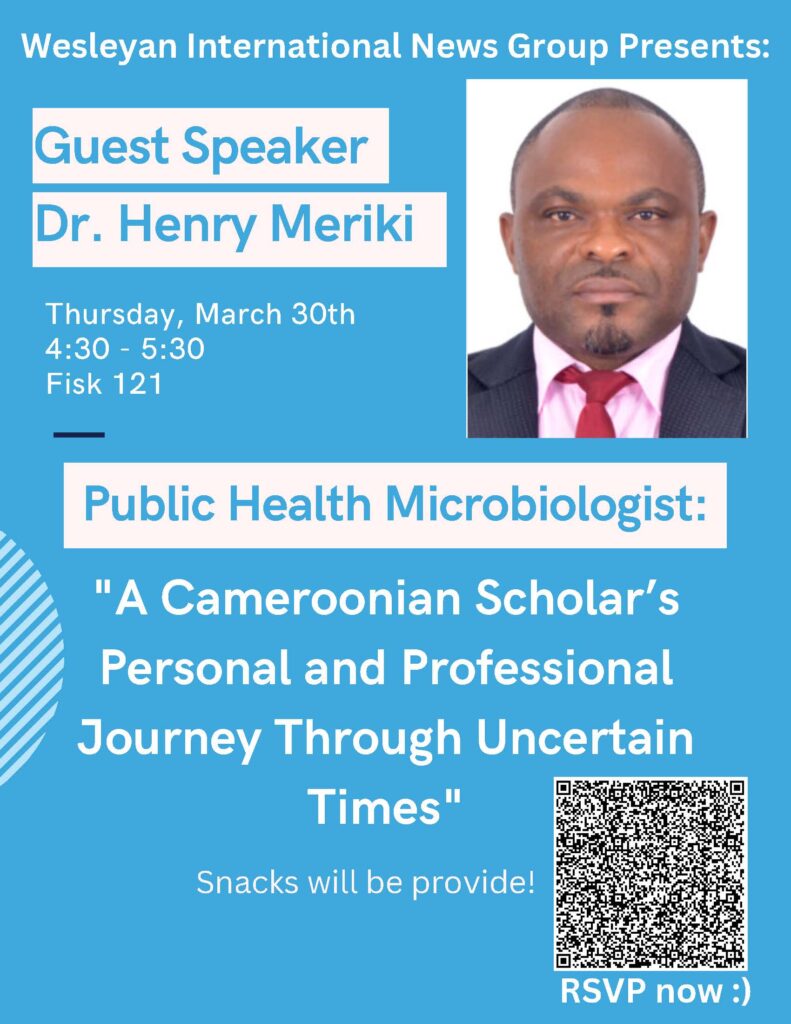Please join the Wesleyan International News Group (WING) to meet Dr. Meriki and learn more about his story. His presentation, “A Cameroonian Scholar’s Personal and Professional Journey Through Uncertain Times,” will be TODAY, Thursday, March 30th at 4:30 PM in Fisk 121. See this link for more information on WesNest.

Wesleyan’s Involvement in the Scholar At Risk Program
The Scholar At Risk program aids scholars, artists, writers, and public intellectuals worldwide to escape persecution and continue their professional lives through temporary teaching and research assignments. Wesleyan joined the New University in Exile Consortium (NUEC), and re-joined Scholars At Risk (SAR) in 2020. Both organizations support scholars and their families throughout their time away from home. The Wesleyan Scholars at Risk (WSR) program committee runs the WSR program in coordination with support from the Fries Center, funding from the Institute of International Education’s Scholar Rescue Fund, and the NUEC.
Academic Opportunity
Dr. Meriki is a lab scientist by training, having earned a Ph.D. in Microbiology and a Master’s in Public Health from the University of Buea, Cameroon. Dr Meriki received the Institute of International Education Scholar Rescue Fund (IIE-SRF) fellowship following an ongoing civil war that escalated in 2017 between the separatist forces of the self-proclaimed state of Southern Cameroon and the government forces of Cameroon. The separatist forces called for “no School” and prohibited civic activities in the two English-speaking regions of Cameroon. Denizens, particularly public service workers, lecturers, and teachers, faced the consequences from the state for not showing up at work and risked retaliation from separatists forces if they went to work. He began instructing at Wesleyan in the 2022 Spring semester, introducing a course titled “Fundamentals of Public Health and Communicable Diseases Epidemiology.” This school year he continues to offer this course, which comes at a crucial moment when understanding public health is more important than ever.
The Scholars At Risk program allows Dr. Meriki to access Wesleyan’s extensive laboratory resources. Technology like electron microscopes is not easily accessible in Cameroon, but Dr. Meriki envisions a future where he can utilize virtual classrooms to share scientific tools with students back home. Though Zoom came with a sharp learning curve at the beginning of the pandemic, it now serves as a technological opportunity to create virtual networks and share academic experiences across the world.
Finding Community at Wesleyan
As a public health specialist, Dr. Meriki’s advice for the Wesleyan community is to keep seeking connections despite the continual COVID outbreaks. People must adapt to new ways of life (such as masking and virtual spaces) when reaching out to friends and relatives. The biggest challenges for Dr. Meriki have been the cultural shift between Cameroon and America, coming into a new community and new culture. He noted that cultural exchange is a large part of the Scholars At Risk Program. Challenges like understanding different accents have been met with enjoying Cameroonian-style hospitality from his Wesleyan co-workers. Dr. Meriki has been able to learn about the US academic culture while sharing his own teaching style from Cameroon. The African Student Organization and African Studies offered Dr. Meriki another place of connection. He has found new friendships in Connecticut but misses his family and his life in Cameroon.
Dr. Meriki will miss Wesleyan when his Scholars At Risk assignment ends this semester. He will miss the Fries Center faculty and his colleagues in the MB&B department and is grateful for all of the support he has received at Wesleyan. His NUEC membership will help him stay in contact with other Scholars at Risk as he finds the next academic opportunity. To sum up his time at Wesleyan, Dr. Meriki shares: “I hope I have been able to impact life of students with my stories, and widen awareness of situation in Cameroon so that peace can return.”
Co-written by Megan Bauerle ’24, mbauerle@wesleyan.edu, and Dr. Henry Meriki, hmeriki@wesleyan.edu


